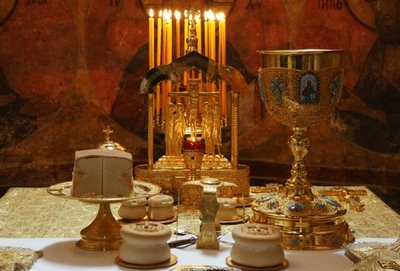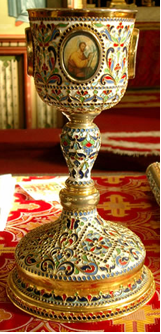
 In his book, Great Lent, Fr Alexander Schmemann states:
In his book, Great Lent, Fr Alexander Schmemann states:
‘…in many Orthodox Churches there developed, and is commonly accepted today, the doctrine which affirms that Communion for laity is impossible without sacramental confession and absolution. Even if someone wishes to receive Communion frequently, he must each time go to confession or at least receive sacramental absolution.
The time has come to state openly that whatever the various and sometimes serious reasons that brought this doctrine and this practice into existence, they not only have no foundation in Tradition, but, in fact, lead to very alarming distortions of the Orthodox doctrine of the Church, of the Eucharist, and of the Sacrament of Penance itself’.1
While Fr Alexander is writing of the Russian Tradition, it is clear that one of the biggest of these distortions that he refers to lies in our understanding of the Eucharist. It is clear, not only from common lay practice, but even in the minds of the Clergy and trained theologians, that we have separated the Eucharist from the Liturgy. By this I mean that we tend to see ‘participation’ in the Liturgy as one thing, and Communion as something else, something ‘extra’. This rationale has been pushed so far that we have placed endless boundaries and hurdles on the layperson’s path to Communion. Clergy who deplore the absence of frequent Communion are often the very people who insist that it is all but impossible for the laypeople to approach the holy Mysteries.
What, then, are these obstacles? The first obstacle is Confession, or even mere ‘absolution’; the second obstacle is the Prayers of Preparation for Holy Communion; the third is fasting (since many have been taught that Communion is impossible without an evening, a whole day or even three days of abstinence from certain foods); and a fourth obstacle (albeit less common) is the attendance of the Service of Matins and, sometimes, even Vespers for ‘worthy’ participation in the holy Mysteries.
Before we look at these ‘obstacles’, I think it is worth noting a commentary by St John Chrysostom on holy Communion:
“There are cases when a priest does not differ from a layman, notably when one approaches the Holy Mysteries. We are all equally given them, not as in the Old Testament when one food was for the priests and another for the people and when it was not permitted to the people to partake of that which was for the priest. Now it is not so: but to all is offered the same Body and the same Cup”.2
Chrysostom makes it abundantly clear that, when it comes to holy Communion, there is no distinction between Clergy and Laity. Whatever preparation is required of the one is required of the other. It therefore seems remarkable that some Clergy insist that the Laity must go to Confession every time they are to take Communion. How many Clergy, I wonder, go to Confession before every Liturgy they celebrate? Is this not a case of the Clergy ‘weighing men down with burdens hard to bear, while they will not even touch the burdens with one of their fingers’? (cf. Luke 11:46). The decline of Confession in many places is certainly lamentable, and the Sacrament of Repentance and Reconciliation certainly needs to be explained and encouraged (not only to those who never or hardly ever go to Confession, but also to those who see it as something mechanical, as though regular confession - with or without genuine repentance - makes us ‘worthy’ of holy Communion). But this ‘rule’ that confession must precede communion, but from which the Clergy are exempt, seems tantamount to supposing that Communion is the ‘obligation’ of the Clergy, but not of the Laity. Furthermore, the insistence on Sacramental Confession prior to Communion seems to display a complete ignorance of the most conspicuous and well-known words of the Holy Oblation: “This is my body…this is my blood…for the forgiveness of sins”. If we truly believe that the Body and Blood of Christ is for the forgiveness of sins, why is it that we require forgiveness of sins in Sacramental Confession or in the prayer of ‘absolution’ before receiving it? The Mystical Supper seems to be the ‘privilege’ of the Clergy, and only after jumping over various hurdles can the People of God take part in that Mystical Supper.
The second obstacle is the Prayers of Preparation for Communion. The idea that the Liturgy itself – its very goal and purpose being participation in the divine Mysteries – constitutes the preparation before and the thanksgiving after holy Communion does not seem to occur to us. Whilst the Clergy are happy to omit so many of the prayers of the Divine Liturgy, we are less willing to dispend with ‘private prayers’ for Communion, as though the Liturgy is a common act of worship, but holy Communion is a purely private affair. The first mention of Communion in the Divine Liturgy is the Second Prayer of the Faithful which is supposed to be read (though in many places it is never even so much as read quietly by the priest) before the Cherubic Hymn:
“Again and many times we fall down before you and beseech you… that heeding our prayer you will cleanse our souls and bodies from every defilement of flesh and spirit, and will grant us to stand without guilt or condemnation before your holy altar. Give also to those who pray with us the grace of progress in right living… Grant that… they may always partake of your holy Mysteries without guilt or condemnation, and be counted worthy of your heavenly kingdom…”
Although it is clear that this is a prayer that is said by the Clergy on behalf of the people (‘Give also to those who pray with us’)3 and so was not necessarily ever intended to be heard by the People, it is a prayer which is made on behalf of the People that they may be made ‘worthy’ to partake of the holy Mysteries. This notion of the Clergy praying that the People may be able to approach Communion is made clear in other prayers (which again are regrettably so often omitted):
“…enable us to offer you gifts and spiritual sacrifices for our sins and those committed in ignorance by the people…”
“…grant communion in your most pure Body and your precious Blood to us, and through us to all the people”.
Nearly all the petitions and prayers from the Cherubic Hymn onwards (The Liturgy of the Faithful)are made with the purpose of preparing for Communion. Likewise, all the prayers of the Divine Liturgy following participation in the holy Gifts are made with the purpose of giving thanks for Communion, although The Prayer of Thanksgiving is in many places omitted or said quietly by the Clergy, despite that there is nothing in this prayer which indicates that it is to be heard by the Clergy alone:
“We thank you, Lord, lover of mankind, benefactor of our souls, that you have counted us worthy today of your heavenly and immortal Mysteries. Make straight our way, establish us all in the fear of you, watch over our life, and make firm our steps, through the prayers and intercessions of the glorious Mother of God and Ever-Virgin Mary, and of all your Saints…”
As for the third obstacle – fasting – there seems to be some confusion between ‘complete abstinence’ before Communion and ‘ascetic fasting’ (abstinence from certain foods). The idea of an ‘ascetic fast’ before Communion seems to have no basis in our Tradition. It is right that those who are healthy enough to fast should abstain entirely from all food and drink on the morning that Communion is to be taken, (except perhaps in exceptional circumstances), just as those who are to receive the holy Mysteries in the Pre-sanctified Liturgy in the evening should abstain completely for several hours before. But Orthodox Tradition does not insist on ‘ascetic fasting’ a day or two before Communion.
The fourth obstacle – that those who are to take Communion should attend Matins and even Vespers – again has no basis. Vespers and Matins are two services quite distinct from the Divine Liturgy. If, as I said, the preparation and thanksgiving for Communion are an intrinsic part of the Divine Liturgy, then participation in the Divine Liturgy from the beginning or at least from the beginning of The Liturgy of the Faithful (after the Gospel Reading) is necessary. And even this is very difficult for some people who may live far away or who have babies and young children. To people under such circumstances we should show the utmost sensitivity and understanding.
Considering the barriers we have placed between the holy Gifts and the Laity, is it any wonder that frequent communion is still a rarity in many places? Our Clergy should be careful that they do not demand of the laity any greater requirement for approaching the holy Mysteries than they do of themselves. The Eucharist is not a reward for good behaviour; it is granted to us for the forgiveness of sins and eternal life. As St John Cassian has put it:
“We must not avoid communion because we deem ourselves to be sinful. We must approach it more often for the healing of the soul and the purification of the spirit, but with such humility and faith that considering ourselves unworthy… we should more greatly desire the medicine of our wounds. Otherwise it is impossible to receive communion once a year, as certain people do… considering the sanctification of heavenly Mysteries as available only to saints. It is better to think that by giving us grace, the sacrament makes us pure and holy. Such people manifest more pride than humility… for when they receive, they think themselves as worthy. It is much better if, in humility of heart, knowing that we are never worthy of the Holy Mysteries we would receive them every Sunday for the healing of our diseases, rather than, blinded by pride, think that after one year we become worthy of receiving them”.4
Some remarks on Inter-communion
All that I have said above concerns Members of the Orthodox Church. But what of the non-Orthodox? Why can they not approach the holy Mysteries in the Orthodox Church? Participation in the Eucharist is the seal of our membership in the Church which is conferred on us in baptism and chrismation and confirmed in the Church’s life and worship. We are only members of the Church in the full sense for as long as we renew our baptism in holy Communion. Anyone who is not a member of the Orthodox Church cannot renew or obtain the seal of such membership. Admittedly, it is not uncommon for members of the so-called (somewhat misleadingly) Oriental Orthodox Churches to be granted permission to participate in the holy Mysteries of the Orthodox Church in special cases. But this is regrettable, for it grants pastoral dispensation where there is no place for it. Either someone is in full Communion with the Orthodox Church or he is not. No one can be Orthodox ‘by special licence’. Communion does not create Christian unity; it is the result of Christian unity.
1 p. 126, SVS Press, 2003
2 Homily on 2 Corinthians, 18.13
3 All the prayers of the Clergy - except for the Prayer of the Cherubic Hymn, which is of later origin - presuppose a concelebrated liturgy, and so use the first person plural: ‘we’, ‘us’ (the Clergy).
4 Third Conference of Abbot Theonas on Sinlessness, Ch. 21
